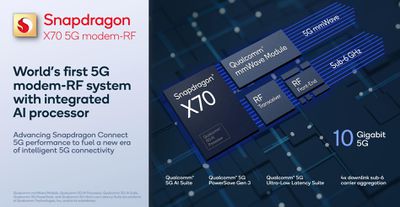Qualcomm has unveiled its new 5G Snapdragon X70 modem, which is likely to be the last Qualcomm modem to be used by Apple in its iPhones before it switches to in-house custom-designed chips.

Qualcomm says its latest 5G modem for smartphones includes "the world's first 5G AI processor integrated in a 5G Modem-RF System," which is supposed to increase the average download and uplink speeds on mmWave and sub-6GHz bands. From the company's press release:
Snapdragon X70 inherits the unrivaled 10 Gigabit 5G peak download speed of its predecessor and packs in new, advanced capabilities such as Qualcomm 5G AI Suite, Qualcomm 5G Ultra-Low Latency Suite and 4X carrier aggregation to achieve unmatched 5G speeds, coverage, signal quality and low latency. The Qualcomm 5G Ultra-Low Latency Suite in Snapdragon X70 allows OEMs and operators to minimize latency for hyper-responsive 5G user experiences and applications.
"Our 5th generation modem-RF system extends our global 5G leadership and the introduction of native 5G AI processing creates a platform and inflection point for performance-enhancing innovations," said Durga Malladi, senior vice president and general manager, 5G, Mobile Broadband and Infrastructure, Qualcomm Technologies, Inc. "Snapdragon X70 is an example of how we're realizing the full potential of 5G and making an intelligently connected world possible."
According to the company, the Snapdragon X70 can reach up to 10Gbps downlink speed and a peak 3.5Gbps upload speed, and yet it is up to 60% more power efficient, due to its 5G PowerSave Gen 3 technology. The modem also includes support for global 5G multi-SIM and Dual-SIM Dual Active.
The Snapdragon X70 modem is expected to launch in 5G devices by the end of this year, although that doesn't necessarily mean it will appear in the iPhone 14, or indeed any future iPhone.
In a 2020 agreement to dismiss a long-running legal battle between Apple and Qualcomm, a settlement filing revealed that Apple has committed to using X65 and X70 modems in products launched between June 1, 2022 and May 31, 2024, which would seem to suggest the X65 will be used in the iPhone 14, while the just-announced X70 modem will be in Apple's 2023 iPhone series.
However, other reports have suggested Apple will have its own custom-designed 5G modem ready for use in 2023 iPhone models, so it's not entirely clear where the X70 fits in. Apple could end up using its own chips in most regions, and rely on Qualcomm for X70 chips in certain areas (or certain models), which could explain why Qualcomm says it is expecting to supply just 20% of Apple's iPhone modems in 2023. When Apple's agreement with Qualcomm ends, Apple will switch to its own custom-designed cellular modem for all future devices.
Rumors in early 2019 suggested that Apple was planning to design a modem in-house, and in mid-2019, Apple purchased the majority of Intel's smartphone modem business to accelerate its own development efforts. Apple took over Intel's modem-related intellectual property and hired 2,200 Intel employees, and it has already lined up its main chip manufacturing partner TSMC to begin producing the majority of its new in-house modem chips.























